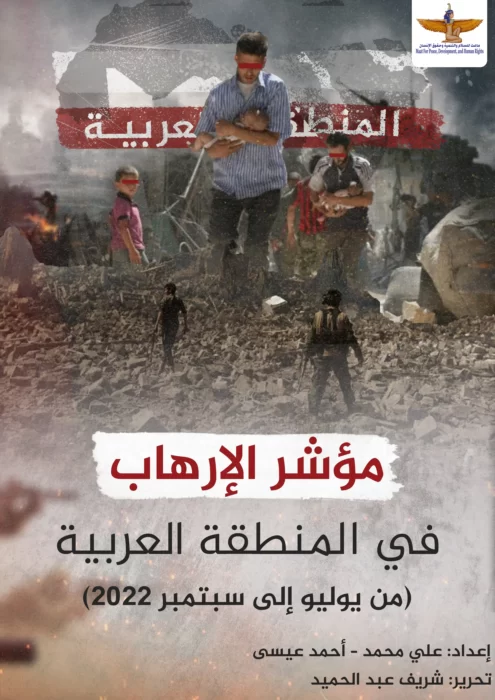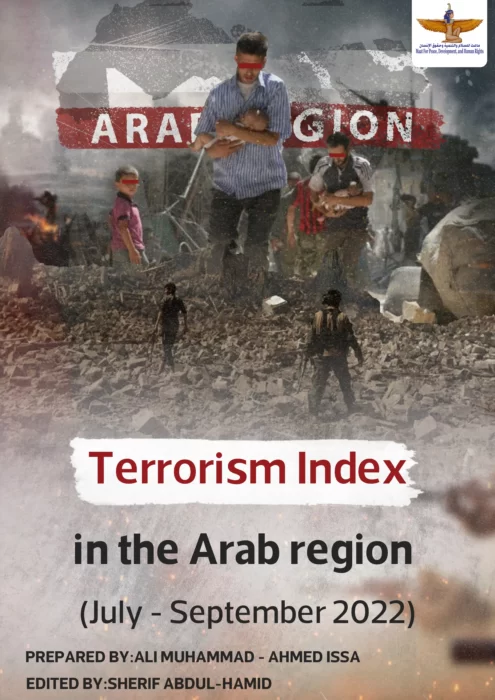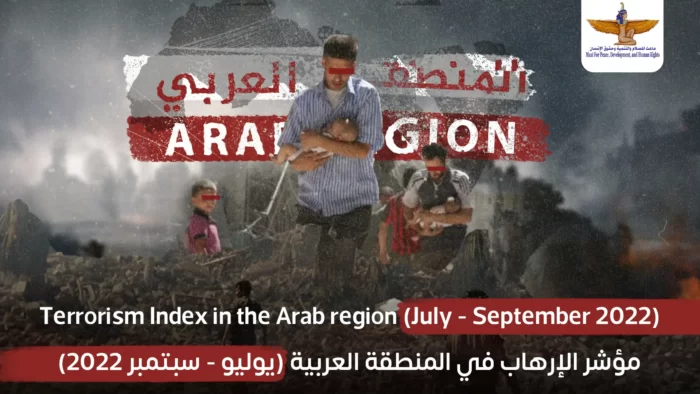Okeil: Non-conventional methods must be adopted in order to combat terrorism and benefit from international expertise
Sherif Abdul-Hamid: Conflict countries are fertile ground for terrorist groups to spread extremist ideologies and recruit young people
Ali Muhammad: Scientific and academic studies that address the causes of extremism and terrorism must be encouraged and increased
Maat for Peace, Development and Human Rights issued its quarterly report entitled "Index of Terrorism in the Arab Region during the Third Quarter of 2022", which monitored and analyzed the phenomenon of terrorism in the Arab region, as well as relevant activities and interactions within terrorist groups during the period from July to September 2022. In order to track terrorist operations, the report adopted various research and investigative approaches, with the aim of achieving the greatest possible benefit and producing the most accurate results.
The report documented the occurrence of 135 terrorist operations in eight Arab countries during the period covered by the report, which is a slight increase from the operations that took place in the Arab region in the second quarter of 2022, when 123 terrorist operations were carried out. These operations claimed the lives of 307 people, while 398 others were left injured. These operations targeted both military personnel and civilians, and resulted in the death of 155 military personnel and about 241 injuries, while 152 civilians were killed and about 157 others were injured. Somalia topped the terrorism index in the Arab region in the third quarter of 2022, with 42 terrorist operations, accounting for 31% of the total terrorist operations. The same country also topped the death and injury index, with 173 dead and about 191 injured.
The report indicated that ISIS is still at the forefront of the groups carrying out terrorist operations in the Arab region; as it has adopted 35 terrorist operations. The report indicated that, despite the preemptive strikes directed against the organization and its affiliated branches, it is still able to move and maneuver, especially in Syria and Iraq. Its main routes are the Iraqi-Syrian borders. The number of ISIS armed militants ranges between 6 to 10 thousand fighters, and they camp at the rural and mountainous areas, hiding away from the security forces.
According to the report, conflict and Arab countries going through faltering transitional periods, such as Iraq, Syria, Somalia, Yemen and Sudan, recorded the majority of terrorist operations, as terrorist groups carried out 130 operations in the five countries, which is 96.3% of the total terrorist operations in the Arab region in the third quarter of 2022.
For the first time since the beginning of the year, Libya did not report any terrorist operation. The report attributed this achievement to the efforts made by the Libyan National Army, which resulted in the arrest and killing of terrorist cells and elements in the period covered by the report, including the terrorist Mahdi Dango, the “mastermind” behind the killing of the 21 Egyptian Copts, in September 2022, in addition to the military coordination between the security institutions in eastern and western Libya after the meeting that brought together these institutions on July 19, 2022. This meeting resulted in a joint statement calling for the rejection of violence and internal fighting, and the report warned that the continued presence of two parallel governments may push Libya to fall into the grip of terrorism, especially in light of the stationing of an estimated 100 militants affiliated with ISIS in vast areas in the southern region.
Finally, the report presented a set of recommendations, including amending the third paragraph of Article 1 of the Arab Convention For The Suppression Of Terrorism to include terrorist attacks carried out by drones as a terrorist crime; urging countries that have not yet ratified the Arab Convention on Suppression Of Terrorism to complete its ratification procedures, as well as for Arab countries that are not members of the Global Coalition Against Daesh to join the Coalition to exchange good practices and lessons learned and benefit from advice; adopting unified Arab positions to remove all mercenaries and foreign forces from Arab countries, especially countries in conflict situations.
In this context, Ayman Okeil, the international human rights expert and the President of Maat said that the Arab region is still in urgent need to confront terrorism by creative and non-conventional means and dry up the root causes thereof, especially social and economic grievances that nurtured it, in addition to promoting a culture of human rights and spreading tolerance. Advocating sectarianism instead of citizenship, not restricting weapons to the state, soft borders between some countries, and the exacerbation of hate speech in times of crisis and turmoil are all among the factors that have nurtured terrorist groups in the Arab region, especially ISIS, and empowered them to exploit these factors to their benefit, thus posing a real threat to national security in Arab countries.
Okeil stressed that defeating terrorism will not be achieved in the Arab region except by intensifying intelligence and security cooperation and initiating practical steps to prevent external interference in the affairs of Arab countries and exchanging good practices, good experiences and lessons learned with the members states of the United Nations.
For his part, Sherif Abdel Hamid, Director of the Research and Studies Unit at the Maat Foundation, said that the Arab region is still vulnerable to the threat of terrorism, which finds in countries involved in armed conflicts, internal conflicts with armed groups, or political conflicts a ready opportunity to establish a foothold to spread its ideologies and recruit other followers. Perhaps the resurgence of al-Qaeda in Yemen during the recent period and the inability to rein in the youth movement in Somalia is a harbinger of danger that calls for additional efforts to combat terrorism.
For his part, Sherif Abdul-Hamid, Director of the Research and Studies Unit at Maat, said that the Arab region is still vulnerable to the threat of terrorism, which finds in countries involved in armed conflicts, internal conflicts with armed groups, or political conflicts a ready opportunity to establish a foothold to spread its ideologies and recruit other followers. Perhaps the resurgence of al-Qaeda in Yemen during the recent period and the inability to rein in the youth movement in Somalia is a harbinger of danger that calls for additional efforts to combat terrorism.

 |
 |
shortlink: https://maatpeace.org/en/?p=36948












